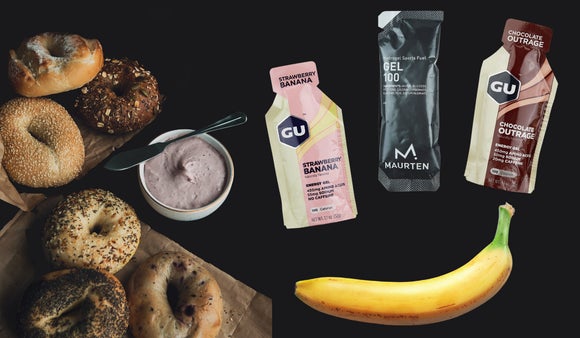Ultimate Guide to Running a Successful First Marathon
Updated: 10th March 2025

So, you signed up for your first marathon? Whether you did so enthusiastically or hesitantly, congratulations! There is something special about running a marathon, and it's an achievement to be proud of. No matter your reason for committing to running a marathon, we imagine one common goal for every runner is to cross the finish line feeling good (well, as good as one can after running 26.2 miles). This step-by-step guide is to help you do just that.
A marathon is what you make of it, so the better prepared you are, the better you will perform. There is no such thing as cramming for a marathon in the same way you could maybe cram for a test. Running a successful marathon requires preparation and dedication. This guide is designed to prepare you, but it's up to you to show up and put in the work.
Tip #1: Find a Training Plan
One of the very first things to do after signing up for a marathon is to find a training plan. Even if you don't have specific time goals, you still need to train in order to get your body ready for the physical and mental demands of running 26.2 miles. There are tons of free training plans available on the internet that cater to beginners. Most plans range between 16-20 weeks, with each week ending with a "long run." Don't skip your long runs! These runs are designed to build endurance and get your body acclimated to running for multiple hours at a time. We also recommend choosing a plan that incorporates at least one 30+ kilometre long run.
Tip # 2: Pick Your Training and Race Day Shoes
There is a lot to discuss when it comes to running shoes and training for a marathon—too much to cover in this guide. This article is intended to be a comprehensive overview of all aspects of the marathon, not just running shoes. Be sure to check out our Best Marathon Shoes guide for in-depth recommendations.
At the outset, you should decide whether you want to use a different shoe to train in and another to race in or if you want to train and race in the same shoe. Not all shoes are created equal, so it is important to consider what your race goals are. If you have a specific time goal, then you may want to consider a lightweight, carbon-plated shoe designed specifically for racing. You would then want to do the bulk of your training in a different shoe, as marathon racing shoes are not durable enough to handle all of your training miles. If you do not have a time-specific goal and just want to finish the race, then it is perfectly fine to use the same shoe to train and race in. If this is your plan, then finding the most comfortable and durable shoe should be your top priority. Here are two options to consider, depending on your racing goals.
Our Top Picks
 |
BEST SUPER SHOE FOR BEGINNER MARATHONERSPUMA Deviate Nitro Elite 3 |
|
The PUMA Deviate Nitro Elite 3 is a carbon plated road racing shoe designed to deliver top performance in long distance races like the half and full marathon. With a durable upper and stable base, the Nitro Elite 3 will provide long-lasting comfort, making this a perfect race day shoe to train in as well. |
|
 |
BEST MARATHON RACING SHOESadidas adizero Adios Pro 4 |
|
The adidas adizero Adios Pro 4 has every element of the shoe finely crafted to optimise performance, making tit a true marathon powerhouse. Whether it's crushing a new PR or conquering the demands of elite racing, this evolution in speed was created for runners who seek nothing less than victory. |
|
Tip #3: Research the Course Route
If you're the type who likes to be as prepared as possible, then consider looking at the marathon course route and its elevation profile. The more you know about the course, the better you can prepare for your training. If you know there will be rolling hills between miles 13-16, then you can incorporate rolling hills in your training to simulate what that will feel like during the race.
Tip #4: Make Your Travel Plans
If you signed up for a race out of town, make your travel plans early! The last thing you want to do in the days leading up to the race is expend time and energy figuring out where you're going to stay or how to get to your destination. Make your reservations early and keep all of your important documents (i.e., race confirmation, flight information, hotel reservation, etc.) in one place, digitally or otherwise.
Tip #5: Fuel and Hydrate Properly

Being properly fuelled and hydrated may be the most important factor in having a successful first marathon. Running a marathon pushes our bodies to the limits, so it is vital to maintain adequate fuel and stay hydrated throughout the race. And this is not just limited to race day; it is also important to dial in your fuelling during training. Figure out what type of fuel works for you. Not all gels are alike, and some work with your stomach better than others. What about chews? Or drink mixes? There are several options out there, and we recommend trying out different types of fuel from different brands to see what you like best. Once you find out what works, be sure to use that fuel during your long runs. In addition to deciding what to fuel with, you'll also need to figure out how to carry your nutrition on race day. Unless you plan to use the fuel provided on the race course, you'll need to have it on you during the race. Fine-tuning all of this will absolutely pay huge dividends come race day, so do NOT neglect this step!
Tip #6: Recover
Remember, just making it to the starting line is a big win. The body goes through a lot during marathon training. Even the pros are susceptible to training injuries, so it is essential to take the best care of your body during training. A huge component of that is giving your body time to recover. Many first-time marathoners have never run the distances they will be running during training, so it is critical not to push your body over its limit. Make sure you are taking rest days, going easy on easy runs, getting enough sleep, and listening to your body. If your training plan calls for a run, but your body is feeling really sore or fatigued, skip it. Missing a run here and there during your training is not going to make or break your performance on race day.
Tip #7: Pack Your Bags
Once you have completed your marathon training and you are all set to go, let's talk about your travel bags now. Make sure to create a packing list so you don't forget anything. If you are flying to your destination, pack your race day kit and essentials in your carry-on bag; this includes any food you'll be eating in the days leading up to the race. Don't assume that your check-in bag will make it to your destination at the same time as you!
Tip #8: Easy Ways to Carb Load For A Marathon

One way to avoid hitting the dreaded but very real "wall" is by carb-loading in the days leading up to the race. Simply stated, loading up on carbs a few days before the race will give your body the energy it needs to get through the race. A few carb-heavy foods that are easy to find and keep on hand are bagels, sports drinks, and graham crackers.
Tip #9: Prepare The Night Before A Marathon
The night before a marathon can be very stressful. After all, you are mere hours away from the main event that you've spent months training for. It is understandable to be anxious; the key is to manage those emotions. First of all, make peace with the fact that you're probably not going to get the best night's rest. Stressing out about how early you need to get up is only going to keep you awake longer. Besides, how many days in your life have you woken up before the sun comes out to run 26.2 miles? We're guessing the answer is not a whole lot. Thus, embrace the new experience you are about to embark on rather than stress about one night of not having the best sleep.
The night before the race is also your chance to get all your racing essentials together to ensure nothing gets left behind in the morning. We recommend laying out your race kit for the following morning. Be sure to pin your racing bib onto your clothing, as you'd be surprised how difficult that task can be when you are half asleep in the morning.
Another essential thing to arrange the night before is how long it will take to get to the starting line in the morning. Plan ahead where you will park, and take note of any shuttles that may be necessary for the race. With that in mind, you can set your alarm with confidence that you won't be racing to get to the starting line before your actual race even begins!
Tip #10: Get To The Race With Time To Spare
With early morning start times, it can be easy to want to hit the snooze alarm on race day, but it is important to stick to a schedule so your morning is as stress-free as possible. Give yourself enough time to eat breakfast and go to the bathroom before you leave for the race. Expect to experience traffic, as there are potentially thousands of other racers trying to get to the starting line at the same time as you. Additionally, anticipate that parking, race shuttles, and walking to the starting time will take longer than planned due to the crowds. Last but not least, many marathoners will try to get in that last bathroom break before the start, so expect long lines at the porta-potties as well.
Tip #11: Enjoy the Race!
When the race starts, it's completely normal to feel nervous. The adrenaline will probably have you starting out faster than you planned. Just be mindful of that and try to make any adjustments early on so you don't burn out. Stay on top of your fueling and hydration. Don't forget to soak in the sights and sounds of the race. Read all the signs, thank the volunteers for being out there, and take in the scenery. Bottom line, be proud of yourself and have fun out there! Running a marathon is a huge accomplishment and one worth celebrating.

